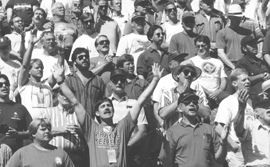
by George Ringwald

If you thought we were done with men beating their
breasts over their failed manhood when Robert Bly's "wild men" faded into history or with the dispersal of the Million Men who marched, you have another thing coming. You obviously hadn't heard of the Promise Keepers. (Neither had I, for that matter.)
They gathered nearly 3,000 strong late in July at Humboldt State University's Redwood Bowl to celebrate their manly godliness with Jesus Christ.
One is tempted to lament, along with the inimitable Yogi Berra: It's deja vu all over again. Or perhaps to do a turn on Freud and cry: What do men want?
What the Promise Keepers (PK) want is plain enough to John Gordon, who from his office above the Sherwin-Williams Paint store in Eureka holds forth as one of seven PK ambassadors for Humboldt County. It is to get men back into the Christian fold.
Gordon, who is 47, husband, father and grandfather, and who himself attends two churches (First Covenant and Nazarene), put it this way: "In the '50s and pre-World War II even, the father was always the head of the household.... He was the role model. Sons always wanted to follow what the father was doing.
"But in this day and age we seem to have lost that. Children don't have role models as far as men, and the role models that are given to them, which you see on TV, the media and everything else, are not what I'd want my children to follow."
The media, one quickly gathers, aren't exactly favorites with Promise Keepers.

One of the "Media Guidelines" for the PK Wake-Up Call at Redwood Bowl ( "wake-up calls" are mini-versions of the national conferences held by Promise Keepers) cautioned that attendees "may only be interviewed concerning their own personal reaction to the event."
Gordon explained that by saying, "National representatives are the ones who can tell you what the policies are --stands on homosexuals, stands on environment, what are the political stands."
At another point, Gordon told me, "I know that, being a journalist, you're always looking for the controversy in it.... That's what sells."
Funny how people always figure out what I'm looking for. I could have told him that what I'm really looking for is truth, and that's a lot harder to find than controversy, but what the hey, right?
At the Redwood Bowl for the Wake-Up Call, I stood at the foot of the 2,700-seat grandstand -- which was already packed at 8 a.m. with the faithful -- beside a solid-looking fellow with a beginning growth of beard who wore a leather jacket and sandals, and who introduced himself as Michael Burke -- "Eureka-born and raised, 43 years."
Trying to stick by that media guideline and not go seeking out controversy, I asked him what he likes about Promise Keepers. "It encourages one another," he said. "It helps define what manhood means in the '90s."
Is it any different, I wonder, from what it was, say, in the 1890s?
"The climate today in America," he answered, "is trying to redefine manhood to mean something different from what it was in the 1890s. I think the environment today can make things worse. Today, through the media ..." -- Uh-oh! -- "...there are voices (that speak for) the homosexual lifestyle or the non-husband-wife relationship."
And it's that old devil media, Mike intimated, that makes it "easier for men to accept (these deviate ways) as a normal way of life."
While we were talking the men in the stands had risen to their feet and, with all the histrionics of a revival meeting, were clapping and singing along with the PK musicians on the rostrum. One of the pastors warmed up the crowd with a series of patent gospel questions, which brought the expected response. "Who is King of Kings and Lord of Lords?" he asked, and the crowd answered with a roar: "Jesus!"
Another minister of the gospel took the microphone to pray and talk, telling the Promise Keepers that he has "a beautiful wife," and they have eight children. There was a murmured riffle of approval, and the pastor was ready with the punch line. He noted that God's first command was to "be fruitful and multiply," and he said he'd lost no time in doing just that. A bit of locker-room humor -- appropriate enough, here on the HSU field for jocks -- which evoked an outburst of good-fellow laughter from the stands.
During my chat with Mike, I learned that he himself is a preacher, for the Gospel Outreach church, and he said it was through the church that he "came to know the Lord personally."
Growing up, he confessed, "I lied a lot ... I started going through some life changes when I was about 20 years old. The normal processes of change from boyhood to manhood were overwhelming me. When I would do something wrong, I wasn't courageous enough to tell the truth. My dad was raised in a Catholic church, but he didn't impart much of what I know."
Interestingly, 66 percent of 3,506 respondents to a Promise Keepers survey had disagreed with the statement: "My father was an excellent model of masculinity for me." Promise Keepers obviously are not immune to the pain caused by what is referred to in today's psychoanalytic argot as "the Father Wound."
I encountered another possible instance of this in a talk I had with Lee Kraemer, from Ukiah, who is part of the PK ambassador network. He's been a Promise Keeper since 1994, which was about the time that "all kinds of things went wrong" in his life.
"I was in a business that got impacted by the 1986 tax reform act," he related. "I lost my father, and I had a lawsuit at the same time."
Asked if he'd had a close relationship with his father, Kraemer replied: "In some ways, yes; in other ways, no. We grew up in an era when 'Boys don't cry.' We really never developed the relations that ladies have. Men have to develop those relationship skills."
The "ladies" on this last Saturday of July were manning -- if you will -- a number of booths in Redwood Bowl, along with the entrance lineup.
At the Books booth, a woman who identified herself as Marlene told me: "This is a men's conference, and the men asked women to volunteer. It's only to free up the men so they can do their job."
(I was reminded of nothing so much as the comment of a woman I interviewed in Japan in the early 1970s about her activist role in an equal rights movement: "We (women) are accepted as equals, but we're still expected to make the tea for the men.")
Men are the ones called upon to keep the seven promises of the PK creed -- among them, to honor Jesus Christ, to pursue "vital relationships" with a few other men, and to practice "moral, ethical and sexual purity."
But the women, as John Gordon sees it, are "the promise reapers." He asks rhetorically: "Why would a woman want to rebel against being taken care of and protected?"
Promise Keepers, Gordon says, is not about male-bonding, as it was in the Robert Bly era. "I think that's kind of dwindled," he opined, "probably because there was not any real substance to it -- no foundation."
"And it's not getting men to get in touch with their feminine side either," Gordon adds with a laugh.
Is there something wrong, I wonder in my naiveté, with men acknowledging their feminine side?
"Well, I don't know that there is a feminine side to men," Gordon replies, "because we're made different. We're made intentionally different, by the nature of how God made us. Women were to be women, and men to be men.... I'm not a feminist, I'm masculine. I'm a male."
(There are those who would argue that the inability or unwillingness of men to recognize the anima in their makeup is at the heart of their perceived difficulty in proving themselves capable of compassion -- "Men don't cry.")
"Promise Keepers," Gordon says, "is solely a resource for men to come into a relationship with Jesus Christ and return to the church, to be supportive of the pastor, to grow in the Word. And to say that it's anything else is wrong. It's not a political movement -- they're nonpartisan. It's not a fad, it's something that's always been there."
Well, at least since March 20, 1990, when PK founder Bill McCartney (then head football coach at the University of Colorado -- to intimates he's known as "Coach Bill") and a friend first discussed the idea of filling a stadium with Christian men. The first Promise Keepers conference was held the following year, and growth in the past six years has been phenomenal -- both in numbers of disciples and in dollars collected.
There were 4,200 men at the one conference in 1991, and in 1996 Promise Keepers filled 22 stadiums nationwide with 1.1 million men. This Oct. 4, Promise Keepers plans a Sacred Assembly in Washington, D.C. (It was originally planned for last year, "but too many people felt it was a political move," Gordon explained.)
From its humble beginning, Promise Keepers has moved into the ranks of big business. Last year, according to a recent Associated Press report, its revenues came to $96.1 million, mostly from sales of $60 tickets to the 22 stadium conferences.
Locally, the Northcoast Christian Fellowship, for which PK ambassador Gordon serves as event coordinator, promotes such Promise Keepers events as the Arcata Wake-Up Call. The Fellowship, Gordon says, "is a nonprofit ministry for the sole purpose of evangelism and supporting other churches. We do that through the Emerald Coast Herald -- we do 10,000 copies every month over the North Coast."
Promise Keepers doesn't count "members." As Gordon puts it, "it isn't a member-driven organization exactly." Attendance at quarterly PK breakfasts, from Humboldt and Del Norte counties, "usually runs close to a hundred men," Gordon reports. "We've had events that have run over 200."It is estimated that anywhere from 700 to 1,000 men on the North Coast have attended national conferences, such as those held last year in Oakland, Calif., and Eugene, Ore.
Whether Promise Keepers is here to stay, as disciples like John Gordon predict, or whether it fades away, as have other male breast-beating movements ... well, who is to say?
But for now it has at least won some guarded support from women outside the movement who might otherwise have been totally skeptical. And that's no small win.
This is how two Humboldt women of a feminist bent summed up a recent discussion of the Promise Keepers movement: "If what they're asking these men to do is support their families, not beat their wives, and pay child support, how can we be opposed -- whatever their religions?"
George Ringwald is a free-lance writer in Eureka with a former life as a reporter for the Press-Enterprise in Riverside and Tokyo bureau chief for Business Week.
The North Coast Journal Table of Contents